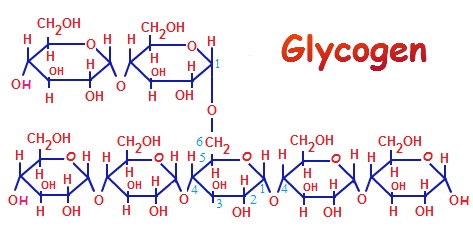Carbohydrates and glycogen stores are the gold standard of cycling performance. Managing them is vital to efficiency on and off the bike. Many recreational and competitive cyclists are not aware of the importance of carbohydrates and glycogen for proper training and performance. But is glycogen a carbohydrate? Or are they one in the same?
Most people have an understanding of carbohydrates and if you’re a cyclist you’re already familiar with glycogen. It’s the feeling of boundless energy and drive on your ride after a resting for a day or two. Your muscles are adequately fueled with glycogen. After the third day out in a row, you feel sluggish and your cycling suffers because you’ve depleted the glycogen in your muscles.
The Glucose Connection
Glycogen and glucose are the two forms of sugar your body uses to store and use as energy. Glucose is the sugar your body converts into energy. Glycogen is the sugar your body stores. Your body can’t use glycogen directly as a source of energy — and cannot store glucose.
What is a Carbohydrate
Carbohydrates are the body’s main source of energy. They are called carbohydrates because at the chemical level, they contain carbon, hydrogen, and oxygen. Carbohydrates are processed by the body and used immediately as fuel. Carbohydrates are macronutrients, meaning they are one of the three main ways the body obtains energy, or calories.
Glycogen Storage
Is glycogen an carbohydrate? Sort of. Glycogen is the storage form of carbohydrates. While glycogen is “gold” to cycling performance, the body has a limited capacity to store it. Since glycogen storage capacity is limited, many high performance cyclists find it difficult to keep up with sufficient carb intake and therefore can suffer from glycogen depletion.
Carbs to Glycogen
Your body cannot store carbohydrates in the same form that it ingests them. Therefore it converts carbs into glycogen through a process known as glycogen synthesis or glycolysis.
The Process
The process can easily be understood by scholars, but to cyclists the science behind it can get confusing and will make your eyes glaze over. In a nutshell, glycolysis is the breakdown of glucose from carbs. The actual energy of glycolysis comes from glucose, or our stored form of glucose, which is glycogen.
The Science of Carbs
The role of glycogen (could be referred to as stored carbohydrate in the muscle) in aerobic exercise has been clearly shown to be associated with increased work output and duration. But carbohydrates are the body’s preferred fuel during endurance exercise due to its more efficient energy yield per liter of oxygen consumed. At lower intensities, even the low end of the endurance zone, your body burns fat for fuel but at any activity level above this, carbohydrates are the preferred fuel source.
You Need Both
It is crucial to have good glycogen stores in addition to proper carbohydrates particularly for exercise lasting longer than 2 hours.
How Much
Carbohydrate intake should be based on the rate of glycogen depletion and the physical activity a cyclist is engaged in. Generally speaking, low intensity rides primarily rely on fat while as the intensity increases the amount of carbohydrates needed increases.
The Best of the Best
It’s clear in science and exhibited in the real-life experiences of athletes performing at the highest level. Kenyan runners, undoubtedly the best endurance runners in history, have dominated top events internationally for decades. The percentage of carbohydrates in their diet is 76.5 percent. With that in mind, it’s clear enough to assume that a good carbohydrate diet is of great importance.
Cyclist Tested
In a recent study looking at glycogen depletion in 99 competitive cyclists, they found that about 30 percent of all cyclists had sub-optimal glycogen levels and none of them knew about it.
Too Much of a Good Thing
The daily intake of carbs varies depending of the level of activity and duration. Consuming an excessive carbohydrate diet without the right amount of exercise leads to increased body fat due to conversion of carbs to glycogen to fat. Therefore a recreational cyclist who only trains 1 hour a day should never eat as many carbs per day as a high-performance cyclist.
Glucose to Fat
Your liver can only store a limited amount of glycogen. It’s the equivalent of about three to four hours of normal activity off the bike. When your glycogen reserves are full and you still have glucose in your system, your liver starts to convert the glucose into fat.
Regular Meals
A regular-size meal should fill up your glycogen reserves o it’s customary to store some fat when you eat. If you don’t eat between meals, about three hours later your glycogen levels will be running low and your body starts to convert fat into energy until you eat your next meal. For cyclists, or anyone else for that matter, it’s a natural process of filling up your glycogen supply, storing some fat, and then accessing that glycogen between fuel stops or aid stations.
Is Glycogen a Carbohydrate?
Is glycogen a carbohydrate? You’ll not likely hear cyclists say that they need to ramp up the glycogen in their body, even though that’s one thing that’s happening. Carbs are the terminology typically used to describe the fuel your body needs while cycling. Carbohydrate and glycogen are part of a simple equation that you experience on your own through training and personal experience on the bike. Don’t worry too much about the science behind it. Just get out there with adequate nutrition at regular intervals and you’ll be fine.
